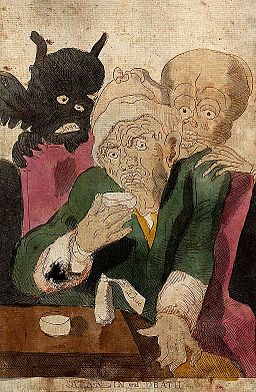How to Escape Mediocrity and Mental Illness
– The Road Less Traveled
The following is a transcript of this video.
“Since ultimately people heal themselves with or without the tool of psychotherapy, why is it that so few do and so many do not? Since the path of spiritual growth, albeit difficult, is open to all, why do so few choose to travel it? It was to this question that Christ was addressing himself when he said, “Many are called, but few are chosen.””
No matter the current state of our life or the problems we face, we all have the capacity for self-transformation, the ability to overcome our problems, and to move towards the ideal of peak psychological health. Yet most of us do not exercise this capacity; rather, we leave our personal problems unsolved and stay stuck in a mediocrity that situates us far below our potential and places us at risk of mental illness. Why is this limiting life-path the norm? In this video, drawing from the insights of the psychiatrist M. Scott Peck, we examine this question and explore how we can be one of the few who proceeds upon the path of personal growth – which Peck called “the road less traveled”.
“Life is difficult. This is a great truth, one of the greatest truths….Most do not fully see this truth that life is difficult. Instead they moan more or less incessantly, noisily or subtly, about the enormity of their problems, their burdens, and their difficulties as if life were generally easy, as if life should be easy…Life is a series of problems. Do we want to moan about them or solve them?”
One of the primary marks of wisdom is the capacity to accept that life is difficult, problems inevitable, and suffering inescapable. A second mark of wisdom is the understanding that if we confront our problems and work to solve them, we will suffer, but it will be the type of suffering that is meaningful and promotive of personal growth. Many of us do not possess these marks of wisdom. Rather, we cling to the illusory hope that if only we can make enough money, meet the right person, or get the right job, then life will be easy. Many of us also try to evade our problems via a variety of avoidance tactics. We blame our problems on other people or social circumstances. We procrastinate, hoping our problems will disappear. We engage in self-deception and deny that we have problems, or we turn to alcohol, drugs, or compulsive technology use to escape awareness of our problems and to numb the suffering that accompanies them. And as Peck observed:
“Some of us will go to quite extraordinary lengths to avoid our problems and the suffering they cause, proceeding far afield from all that is clearly good and sensible in order to try to find an easy way out, building the most elaborate fantasies in which to live, sometimes to the total exclusion of reality…We attempt to skirt around problems rather than meet them head on. We attempt to get out of them rather than suffer through them.”
This attempt to avoid our problems and find an easy way out of suffering is doomed to fail. Not only does it lead us into fantasies and delusions, but it exacerbates our problems and makes us susceptible to a meaningless and neurotic type of suffering that is central to many forms of mental illness. Or as M. Scott Peck explained:
“This tendency to avoid problems and the emotional suffering inherent in them is the primary basis of all human mental illness…In the succinctly elegant words of Carl Jung, “Neurosis is always a substitute for legitimate suffering.” But the substitute itself ultimately becomes more painful than the legitimate suffering it was designed to avoid. The neurosis itself becomes the biggest problem. True to form, many will then attempt to avoid this pain and this problem in turn, building layer upon layer of neurosis…when we avoid the legitimate suffering that results from dealing with problems, we also avoid the growth that problems demand from us. It is for this reason that in chronic mental illness we stop growing, we become stuck.”
There is only one way out of the neurotic suffering of mental illness, and this is to endure the legitimate suffering that is part and parcel of accepting our problems and then actively working to solve them. To heighten our capacity to endure suffering, it is beneficial to remember that suffering is not our enemy, but the greatest of teachers. “Those things that hurt, instruct.”, as Benjamin Franklin put it. Or as the ancient Greek tragedian Aeschylus observed 2500 years ago: The gods have ordained a solemn decree that from suffering alone comes wisdom.” When we stop fleeing from and numbing ourselves to our suffering, then suffering shows us where we are going wrong in life and opens our eyes to the full extent of our problems and the necessity of change. This is why M. Scott Peck labeled depression as a healthy symptom which only becomes pathological when we try to suppress it and evade the life changes that its presence is calling for. Or as Peck explained:
“…depressive symptoms are a sign to the suffering individual that all is not right with him or her and major adjustments need to be made…depression is a normal and basically healthy phenomenon.”
A further benefit of enduring suffering, instead of avoiding or masking it, is that eventually there comes a time when we grow sick of suffering and are struck by an intense motivation to resolve, once and for all, the problems underlying it. Once we cross this “threshold of suffering”, it typically becomes easy to leave behind bad habits and self-sabotaging behaviors, and to cultivate the discipline needed to move in a life-promoting direction. The philosopher Friedrich Nietzsche used this threshold of suffering as a catalyst to eradicate some of his most harmful habits, and as he wrote:
“Indeed, from the bottom of my soul I am gratefully disposed to all my misery and sickness…because such things leave me a hundred back-doors through which I can escape from permanent [bad] habits.”
Nietzsche, The Gay Science
If suffering motivates us to confront our bad habits and problems, we will then have to struggle and suffer in order to overcome them. But in contrast to neurotic suffering which breeds stagnation and a wasted life, this type of suffering is constructive as it leads to personal growth. Or as Peck observed:
“It is through the pain of confronting and resolving problems that we learn…it is in this whole process of meeting and solving problems that life has its meaning….Problems call forth our courage and our wisdom; indeed, they create our courage and our wisdom. It is only because of the pain of problems that we grow mentally and spiritually.”
It is because legitimate suffering is a great teacher and a spur to personal growth that M. Scott Peck observed that: “…wise people learn not to dread but actually to welcome problems and actually to welcome the pain of problems.” Two of the wisest figures in history, Buddha and Jesus, harnessed the pain inherent in their problems to ascend to an elevated level of consciousness that was marked not only by a profound capacity to endure suffering, but also to experience overflowing joy. Or as Peck explained:
“One measure—and perhaps the best measure—of a person’s greatness is the capacity for suffering. Yet the great are also joyful. This, then, is the paradox. Buddhists tend to ignore the Buddha’s suffering and Christians forget Christ’s joy. Buddha and Christ were not different men. The suffering of Christ letting go on the cross and the joy of Buddha letting go under the bo tree are one.”
But it is not just the tendency to avoid the pain of our problems that locks us in a mediocre and mentally ill life. It is also our laziness – for as the psychologist Marie-Louise von Franz wrote:
“When people try to evade problems you first have to ask if it is not just laziness. Jung once said, “Laziness is the greatest passion of mankind, even greater than power or sex or anything.””
Marie Louise von Franz, The Way of the Dream
M. Scott Peck defined laziness as “the force of entropy as it manifests in the lives of us all.” In the external world entropy is the tendency of systems to degenerate into a disordered and stagnant state; while in the inner world of the psyche it is the force of laziness that breeds disorder and stagnation. Laziness is so common and pervasive that Peck called it the one and only original sin, or as he wrote:
“For many years I found the notion of original sin meaningless, even objectionable…Gradually, however, I became increasingly aware of the ubiquitous nature of laziness…original sin does exist; it is our laziness. It is very real…Some of us may be less lazy than others, but we are all lazy to some extent. No matter how energetic, ambitious or even wise we may be, if we truly look into ourselves we will find laziness lurking at some level. It is the force of entropy within us, pushing us down and holding us all back from our spiritual evolution.”
Many will protest that they are not lazy as they work long hours and devote their limited free time to doing chores, spending time with friends and family, and resting. But as Peck notes, “laziness takes forms other than that related to the bare number of hours spent on the job or devoted to one’s responsibilities to ‘others.’…A major form that laziness takes is fear.” (M. Scott Peck, The Road Less Traveled) Although many of us give lip service to wanting to change, grow, succeed, and perhaps even attain greatness, we often fear personal development more than we desire it, simply because of the immense amount of work and effort that is required. This intimate connection between fear and laziness is why the mind unconsciously devises ingenious ways to justify laziness; as but one example, we tell ourselves that our laziness is not really laziness, but merely the drive to relax and enjoy life – a type of refined hedonism. Or as Peck writes:
“In the earlier stages of spiritual growth, individuals are mostly unaware of their own laziness…This is because the lazy part of the self, like the devil that it may actually be, is unscrupulous and specializes in treacherous disguise. It cloaks its own laziness in all manner of rationalizations, which the more growing part of the self is still too weak to see through easily or to combat.”
Friedrich Nietzsche also identified laziness as an entropic psychological force which exhibits devil-like qualities, and he recommended a joyful approach to overcoming it. When we see through our rationalizations and become aware of our laziness, instead of feeling guilty, we should laugh at it in the recognition that it is an innate part of human nature. And then we should remind ourselves that true happiness is not found in maximizing time spent in passive leisure activities, rather, it is a byproduct of voluntary effort in the service of personal growth and meaningful goals. In Thus Spoke Zarathustra, Nietzsche called the entropic force of laziness “the spirit of gravity”, and as he wrote:
“And when I saw my devil, I found him serious, thorough, profound, solemn: he was the spirit of gravity – through him all things are ruined. Not by wrath, but by laughter do we slay. Come, let us slay the spirit of gravity! I learned to walk; since then I have run. I have learned to fly: since then I do not have to be pushed in order to move. Now I am nimble, now I fly, now I see myself under myself, now a god dances within me.”
Nietzsche, Thus Spoke Zarathustra
Enduring the legitimate suffering that accompanies confronting and solving personal problems and exerting a joyful self-willed effort in the quest to override the original sin of laziness, is the road less traveled and the way to escape the mediocrity and mental illness that is so rampant in our age. Some may find this advice to be too general and desire a more specific and personalized plan for overcoming their problems, but as Peck cautions:
“There are many who, by virtue of their passivity, dependency, fear and laziness, seek to be shown every inch of the way and have it demonstrated to them that each step will be safe and worth their while. This cannot be done. For the journey of spiritual growth requires courage and initiative and independence of thought and action. While the words of the prophets…are available, the journey must still be traveled alone. No teacher can carry you there. There are no preset formulas.”
Art Used in this Video
B. Add 6 Heartmend to shopping cart and two will be free when the coupon code HMHOLIDAYS is used.



 academyofideas.com
academyofideas.com
















